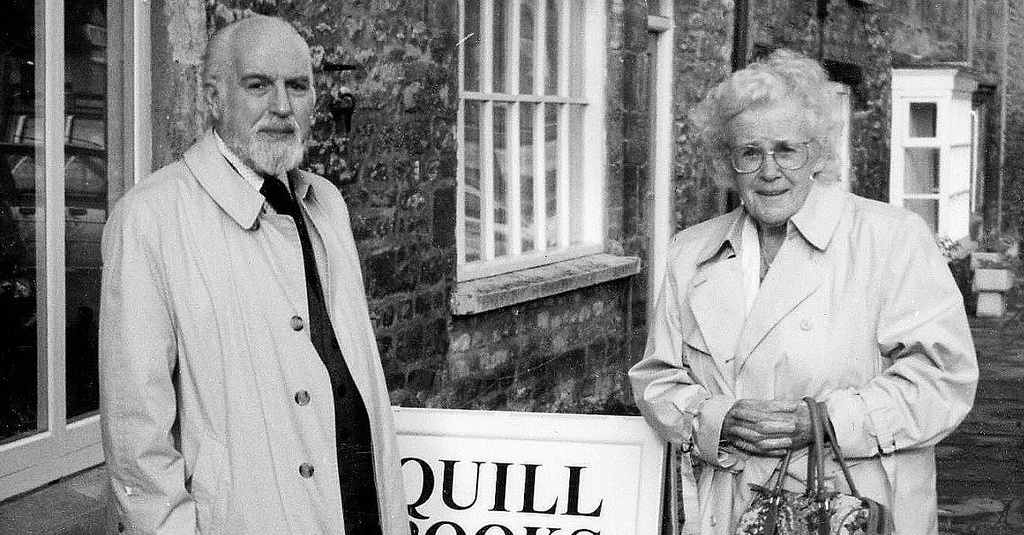
We Should Read More Rushdoony
If you scour Rushdoony’s works, you’ll find paragraphs and chapters ending with what reads like marching orders. He wrote to move men to faith and action, particularly for the laymen who were attached to family, church, work, and education.

- Chalcedon Editorial
Our task as Christians is to move ourselves and our society from the realm of curses to the realm of blessings. ~ R. J. Rushdoony
Harvesting, editing, and publishing the complete works of R. J. Rushdoony remains one of the ongoing missions here at Chalcedon, and we are nearly a quarter of a century since Rushdoony went to be with our Lord. He left that much writing still unpublished, and Chalcedon president Mark Rushdoony along with our small, dedicated staff, are focused and determined to not only complete the publishing phase but to also feature the content in multiple formats so that devoted readers can read, study, and share the treasures of these writings. In short, there is great value in “reading Rushdoony,” and after nearly sixty years of ministry, we believe the best days lie ahead because the majority of the church has yet to discover R. J. Rushdoony. Therefore, we have a duty to work for those who’ve yet to read Rushdoony as much as we do for those who’ve studied his works for many years.
The reason we believe the best days are yet to come is because reading Rushdoony is far more than an academic exercise meant to fill one with theological knowledge. If you scour Rushdoony’s works, you’ll find paragraphs and chapters ending with what reads like marching orders. In other words, he was writing to move men to faith and action, and despite his scholarly approach, he wrote for the laymen who was attached to family, church, work, and education.
Teaching the Kingdom
Next year (2025) will be the sixtieth anniversary for Chalcedon, and besides God’s will, we’re still here because a relatively small amount of supporters and subscribers believe that the work of R. J. Rushdoony and Christian Reconstruction hold the solution for our world, and the only reason the church is still here is because the postmillennial vision is still to be realized. This is why we shun the apocalypticism of dispensationalists and continue our work with confidence during the most difficult of times. We are not fixated on calendars and current events looking for indicators that we are that last generation. Quite the contrary. We are still in the early days of Christ’s Kingdom, as Rushdoony wrote:
Leave it to fools to wonder and imagine about the earth’s last days. Serve God with joy and thanksgiving in these young days of His new creation.1
One reason Rushdoony’s postmillennial vision is a hard sell to the church at large is because it’s accompanied by Christian responsibility. Rushdoony did not preach revivalism—an easier sell—but rather godly work as the means to Kingdom advancement. This equates to a Christian view of the future that many have surrendered to the spirit of the age:
Whenever a civilization loses its faith, it begins to live, not in terms of responsibilities and the future, but in terms of the present pleasure.2
For the humanist, the spirit of the age represents a loss of faith, but for the Christian it results in a practical atheism as the Lordship of Christ is excluded from all areas of life. This is the detrimental idea of neutrality so often mentioned by Rushdoony and Van Til. The end result is that Christians make room for the gods of our time, and they end up blending their faith with values, beliefs, and behaviors from an ungodly source. In his book Chariots of Prophetic Fire, Rushdoony spells out the true nature of this syncretism:
Syncretism is again our problem. The Baalim were lords, other forces, powers, and persons who were accorded sovereignty over man. Today, Baal-worship is again prevalent in the name of the Lord. Humanistic statism is easily and readily submitted to by churchmen: children are placed in humanistic state schools, given into the hands of the enemies of God, and people are only indignant if you condemn this practice. The major concern of most church members is not the Lord’s battles, nor the urgency to make a stand against compromise, but, “How can I best enjoy life?”3
We have a man-centered gospel that sees the daily battles as against those things which interfere with the “good life” we anticipate in the West, and as with politics, modern man is drawn to the podiums and pulpits that promise prosperity rather than those which push and call for responsibility.
Christian Life is Responsibility
Granted, today’s political climate is awakening both Christian and conservative, but the real issue we face is not political nor is it resolved politically or through policy. As Rushdoony noted repeatedly, it is still the faith and character of the people that must change, and that can only happen by the gospel and obedience. It’s what he referred to as “spiritual capital,” i.e., faith and character, but he said it was the task of today’s Christian to work diligently to restore this:
And politics cannot produce character: Christianity must. The decline of faith is a decline of character and a decline of character is the forerunner of political decay and collapse. Christianity has an obligation to train a people in the fundamentals of God’s grace and law, and to make them active and able champions of true political liberty and order.4 (emphasis in original)
Therefore, there must be a return to Christian responsibility, and no other Christian thinker in the modern age has emphasized this point as Rushdoony. His emphasis was restoration through Christian Reconstruction, which makes Christian duty the only means to making a nation or society great:
For our society to regain its strength means to become again a responsible people in the Lord; it means that we stop making excuses for ourselves and for others.5
When it came to discussing Christian responsibility, Rushdoony was direct and plain spoken. It was beyond clear that he was calling all of us to work and faithfulness, and he did not downplay the cost:
We are getting what we paid for, and if we want something else, we are going to have to pay for it, in work, sweat, and sacrifice.6
Freedom in the Biblical sense is always at a price; it is a costly gift, and it requires great things of us.7
There is neither growth, nor peace, nor happiness in solitude. By trying to escape from responsibility to God and to man, they are also escaping from life itself, because life is responsibility.8
We Have Work to Do
Rushdoony taught that we are working to overcome the effects of the curse of original sin, and this is where Rushdoony expands the idea of salvation beyond man’s heart and into culture itself as redeemed man applies his faith to every area of life and thought. This was the thrust behind the idea of godly dominion:
Salvation is not the ultimate purpose of God, although a part of His declared purpose, but the manifestation of His glory and purpose in and through man.9
After the Fall, a curse was laid on man’s work insofar as he is fallen; to the degree that redeemed man is sanctified, to that degree his work again results in godly dominion.10
Such an outlook begs the question, “What are most Christians joyful about if it’s not the work of dominion?” As mentioned above, the concern of the average Christian is typically their own livelihood and not the Lord’s battles or the work of reconstruction. For those of us who do embrace the calling to dominion, the thousands of pages written by R. J. Rushdoony are a helpful resource to equip us for service:
We have work to do, repairing the fences, proclaiming God’s sovereign power and grace unto salvation, exercising dominion and subduing the earth in His name, and rejoicing together as heirs of “the grace of life” (1 Pet. 3:7).11
This is why the writings of R. J. Rushdoony and the work of Chalcedon are vital to our times because they represent a call to Christian self-government and the use of the tithe to take back government from the state. We have the intellectual tools, and we have the tithe. We cannot vote our way to Christian liberty, and until we broaden the role our faith plays in society, we’ll be marginalized and subject to whichever direction humanism takes us:
Without strong, self-governing Christians taking back self-government under Christ in health, welfare, education, and more, we cannot return by politics to less statism.12
No Harvest Without a Planting
It is never too late to begin again the work of reconstruction because God will always bless our obedience and faithfulness. We are not to hide or base our efforts on the political or social climate but rather thrust ourselves fully into the work of reconstruction.
Christian Reconstruction is not a movement marked by the date it began or the time it declined. It was there before Rushdoony because it’s the social application of Biblical faith. Our mission is to ensure the resources are available for those who heed the call and commit to the sacred duty.
If we use the power of the tithe to fund alternative means of government, education, charity, and more, then we’ll see how Christian self-government can be fully realized in such a way as to draw men into the Kingdom. The time to act is always now:
Above all, plant the seeds, sow the Word, establish truly Christian churches, free and independent Christian schools. Establish a Christian family life, and a godly operation in your farm or business life. The times may look bad for making a start, but there is no harvest without a planting.13
1. R. J. Rushdoony, A Word In Season: Daily Messages on the Faith for All of Life, Vol. 1 (Vallecito, CA: Ross House Books, 2010), p. 131.
2. R. J. Rushdoony, A Word In Season: Daily Messages on the Faith for All of Life, Vol. 2 (Vallecito, CA: Ross House Books, 2011), p. 4.
3. R. J. Rushdoony, Chariots of Prophetic Fire: Studies in Elijah & Elisha (Vallecito, CA: Ross House Books, 2003), p. 1f.
4. R. J. Rushdoony, Faith & Action: The Collected Articles of R. J. Rushdoony from the Chalcedon Report, 1965-2004 (Vallecito, CA: Chalcedon/Ross House Books, 2018), p. 161.
5. A Word In Season, Vol. 1, p. 137.
6. A Word In Season, Vol. 1, p. 86.
7. ibid, p. 128.
8. ibid, p. 63.
9. R. J. Rushdoony, God’s Plan for Victory: The Meaning of Postmillennialism (Vallecito, CA: Chalcedon Foundation, 2022), p. 28.
10. ibid, p. 27.
11. A Word In Season, Vol. 2, p. 89.
12. R. J. Rushdoony, Systematic Theology in Two Volumes (Vallecito, CA: Ross House Books, 1994), p. 1142.
13. A Word In Season, Vol. 2, p. 18.

- Chalcedon Editorial